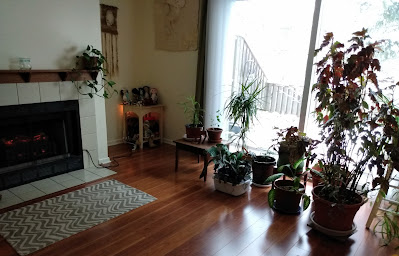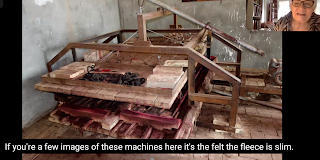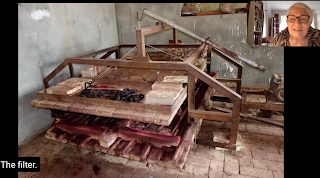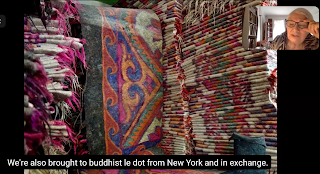Overnight snow, and we woke to a white world, with the snowdrops buried again.
This called for hygge,
knitting, reading another Linda Castillo.
Whichever blogger introduced me to her, thank you, really enjoying Kate Burkholder.
Then I thought I'd make cashew sweet potato and butternut squash soup for lunch, and started the makings.
Then realized I hadn't yet made the stock for it.
Started that with the contents of the stock bag from the freezer and the bones from the recent roast chicken drumsticks, plus an accumulation of yellow onion skins originally saved for dyeing but might as well go here. They'll make a great color ss well as flavor.
And since I'm out of suet blocks for the feeder, the squash seeds will be well received. No doubt squirrel Butternut Boy will find them while they're still warm from the microwave.
Meanwhile lunch is now a salad with sharp cheddar from Wisconsin, really good.
Yesterday I caught two wonderful online lectures, one on molas, blouses, also artworks, which I'll get into tomorrow, so much editing to do.
The other I did get sorted to show you, from the GWU Textile Museum, by researcher Christine Martens, on the history and culture of Uyghur felt making.
This is really important right now, since the Chinese government is harassing, forcibly moving, the Uyghur of northwest China, trying to break down their families and culture, committing atrocities.
The Uyghur are trying to preserve a valuable culture of family and art against great odds. They have a long tradition of felting, revering it, trading in it, from fleece to finished rugs and clothing.
Martens has studied them, as a Fulbright scholar and under other auspices, too. Her recent forays were closely monitored every minute by Chinese government agents.
Here her captioning is so good, I love researchers, that it can speak for itself. Just a reminder about wet felting, I showed you this a while ago, when I made a sample in the course of creating the figure series.
It involves laying fine strands of colored roving like a painting, on a backing, wetting, rolling and applying friction and beating to bond the fibers into felt, but without shifting the design. Very lengthy, labor intensive and skilled work
The Uyghur nowadays also use machines to assist the pressure and vibration of the process. They also use synthetic dyes, not the natural dyes of the past.
Art felt-making is considered a sacred work, an artisanal trust, with prayers recited daily. Both men and women work together, on traditional designs, women often handworking fringes.
Let's roll pix and you'll see.
This is my tiny part in honoring the Uyghur people and trying to preserve what we know of their culture while it still exists.













































What beautiful rugs and they truly are works of art. Such a shame that the Chinese government feel the need to crush people like this.
ReplyDeleteDoes that novel take place in an Old Order Mennonite community? Their women wear those kind of little bonnets. Or Amish perhaps?
ReplyDeleteYou should try coconut milk in that soup! Wonderful flavor combinations.
ReplyDeleteNow these textiles are art that thrill my heart! I simply love color and the brighter, the better. Thanks for this little peek into that particular form of textiles.
Thank you for the information!
ReplyDeleteTheir works of felt art are beautiful. I am surprised I haven't seen more of their designs duplicated in clothes and home decor.
I hope there's No offense to the Uyghur people, but sleeping on sheets in a few of those patterns would end my ever experiencing insomnia again.
Minimiss, it's like the Myanmar genocide of Muslims. Uyghur are also Muslim. Also self directed, can't be controlled by the state, so seen as a danger to the uniformity demanded of the population. Old old story. But we can fight back by shining whatever light we can, to shame the oppressors and support their targets.
ReplyDeleteDebra, it's a series of suspense novels about a police officer in Ohio, in a largely Amish town. She was Amish growing up, understands the culture though she isn't in it any more. She speaks the language. It's a great setting for conflict and suspense. Well written, too, and I'm a picky reader.
We have a lot of Mennonite people in NJ, though only the Pennsylvania Mennonites wear the traditional clothing. The local farm where I shop is a family of Mennonites. Incredible work ethic and cheerful, good businesspeople.
Coconut milk? Noted, Mary. Yes this kind of vibrant texture and color is your style. It's fearless!
As always. you food sounds and looks lovely. Those textiles are so vibrant I almost wish I could touch them. It seems people and cultures are always under threat somewhere. Humans never seem to learn that we are all more similar than not and have the right to co-exist.
ReplyDeleteThat's quite a process to produce those textiles. I wonder how it evolved. Wouldn't it be wonderful to time travel and see the development over the centuries?
ReplyDeleteLooking forward to the mola presentation! I have been in touch e, who knows quite a bit about molas, with some questions about one of the molas that I have.
Enjoy you soup and stay cozy!
What has been happening to the Uyghur people in China is heartbreaking and shocking. I've been hearing about it for several years, it seems, but only recently (like maybe the last 6 months?) have I noticed American main stream media picking it up, but not very substantially, from what I can tell. I have recently been finding videos of what appear to be independent journalists going undercover to tell the stories. That they have (and continue to) put their lives and freedom at risk to get the word out is the only human hope for these persecuted people, I think. Thank you for sharing about some of their creations. Nothing I've seen about the Uyghurs have shown this kind of thing - only the stories of their abuse and persecution.
ReplyDeleteThanks Becki. It's important to see that they're great artists and artisans, as well as a persecuted minority.
ReplyDeleteGreat tribute to the Uyghur people. Persecution of others is such a common theme in human history. We never learn!
ReplyDeleteThese rugs and wall hangings are really wonderful It's a shame they are being persecuted. You'd think China would want to preserve one of its arts.
ReplyDeleteSeeing the pictures of the people working on their art and being down on their knees made me utter an involuntary 'owww' (particularly after having been down on the floor cleaning under the kitchen sink this morning and then wondering if I was going to be staying there permanently when my knees refused to cooperate). I can't imagine having to work long hours in that position.
ReplyDeleteHard to understand how the artists can be persecuted when what they're doing doesn't hurt anyone and obviously they aren't radicals.
I'm reading another Kate Burkholder now - "A Gathering of Secrets". Very good. I don't envy you the snow though we had sleet a couple weeks back and I dislike that even more.
ReplyDeletePam, was it you who mentioned her? If so, thank you. I'm really enjoying another one now, Breaking Silence. They always seem to be out in rain and snow and mud, though!
ReplyDelete